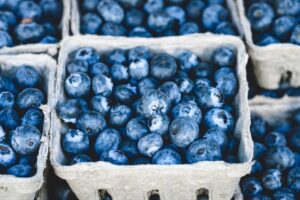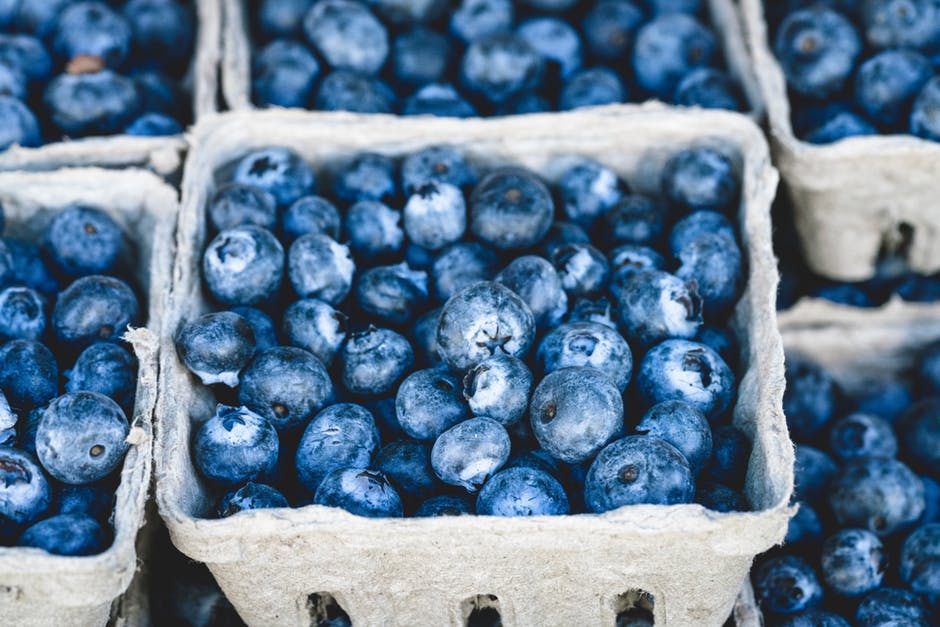Written by Chrystal Moulton, Science Writer. Researchers observed a significant improvement in flow mediated vasodilation in the treatment group compared to placebo at week 12 (0.86% improvement, P <0.001).
 Polyphenols are antioxidant compounds, which has been shown in previous trials to exhibit positive effects in cognition and cardiovascular health1 2,3. Clinical trials specifically focused on blueberry consumption have demonstrated improvement in memory4,5, Cognitive performance6,7, and flow mediated dilation8,9. In the current study, researchers investigated the effect of wild blueberry powder consumption on cognitive performance and vascular function in older individuals10.
Polyphenols are antioxidant compounds, which has been shown in previous trials to exhibit positive effects in cognition and cardiovascular health1 2,3. Clinical trials specifically focused on blueberry consumption have demonstrated improvement in memory4,5, Cognitive performance6,7, and flow mediated dilation8,9. In the current study, researchers investigated the effect of wild blueberry powder consumption on cognitive performance and vascular function in older individuals10.
This study was designed as a randomized, placebo-controlled, double-blind, parallel study. Men and women between the age of 65 and 80 years old, with no chronic diseases, and a BMI between 18-35 kg/m2 were recruited for this trial. Eligible participants were randomly assigned to receive 26 grams of freeze-dried wild blueberry powder [containing 302mg anthocyanins] or placebo. The study duration was 12 weeks. Participants were required to maintain their normal dietary and exercise habits. Volunteers were provided their assigned protocol in sachet packets which they mixed in water to consume daily. During the 24- hours before the start of the trial, fecal and urine samples were collected along with 24-hour ambulatory blood pressure monitoring. The next day, researchers collected flow mediated vasodilation, arterial stiffness, and blood pressure measurements along with blood samples. Participants were then provided with a light breakfast, followed by cognitive tests, and concurrent cerebral blood flow measurements. At week 12 and at one month follow up, all the tests were repeated. The primary outcomes for this trial were changes in flow mediated vasodilation and cognitive tests. Secondary outcomes included changes in arterial stiffness [pulse wave velocity and augmentation index], plasma and urine polyphenol metabolites, gut microbiota diversity and composition, 24-hour ambulatory blood pressure, and in cerebral blood flow.
Initially, 81 participants were recruited and screened for this study of which 66 eligible volunteers were randomly assigned to either the wild blueberry powder treatment group or placebo. By week 12, data from 54 participants could be analyzed. Researchers observed a significant improvement in flow mediated vasodilation in the treatment group compared to placebo at week 12 (0.86% improvement, P <0.001). Researchers also observed a significant decrease in systolic blood pressure in the treatment group by week 12 compared to the placebo (-3.59 mmHg, P = 0.037). In cognitive tests, immediate word recall was significantly better in the treatment group by week 12 compared to placebo (P = 0.043). In the task switching task test, participants in the treatment group saw an 8.5% increase in accuracy scores compared to placebo (P = 0.029). No significant differences were observed in any other cognitive tests as well as secondary outcomes (IE. Arterial stiffness 24-hour ambulatory blood pressure, cerebral blood flow, etc.). Using fecal matter data, researchers observed and overall increase in biodiversity across all participants by week 12 (P = 0.04). Analysis showed no significant changes were attributed to either the treatment or placebo. Correlational analysis found six polyphenolic metabolites which correlated to changes in flow mediated vasodilation and eight polyphenolic metabolites which correlated with changes in immediate recall score.
Overall, results of this study demonstrated that daily consumption wild blueberry powder for 12 weeks improved flow mediated vasodilation and ambulatory systolic blood pressure significantly. However, no significant change was observed in gut microbiota. Additional studies will be needed to verify these findings.
Source: Wood, Eleanor, Sabine Hein, Robin Mesnage, Filipe Fernandes, Nimaya Abhayaratne, Yifan Xu, Zicheng Zhang, Lynne Bell, Claire Williams, and Ana Rodriguez-Mateos. “Wild blueberry (poly) phenols can improve vascular function and cognitive performance in healthy older individuals: a double-blind randomized controlled trial.” The American journal of clinical nutrition 117, no. 6 (2023): 1306-1319.
© 2023 American Society for Nutrition. Published by Elsevier Inc. All rights reserved.
Click here to read the full text study.
Posted August 12, 2025.
Chrystal is a 2008 graduate of the University of Illinois at Chicago. She graduated with a bachelor’s in psychology with a focus on premedical studies and is a licensed project manager. She currently resides in Chicago.
References:
- Martini D, Marino M, Angelino D, et al. Role of berries in vascular function: a systematic review of human intervention studies. Nutr Rev. Mar 1 2020;78(3):189-206. doi:10.1093/nutrit/nuz053
- Hein S, Whyte AR, Wood E, Rodriguez-Mateos A, Williams CM. Systematic Review of the Effects of Blueberry on Cognitive Performance as We Age. The journals of gerontology Series A, Biological sciences and medical sciences. Jun 18 2019;74(7):984-995. doi:10.1093/gerona/glz082
- Lamport DJ, Williams CM. Polyphenols and Cognition In Humans: An Overview of Current Evidence from Recent Systematic Reviews and Meta-Analyses. Brain Plast. Feb 9 2021;6(2):139-153. doi:10.3233/bpl-200111
- Whyte AR, Cheng N, Fromentin E, Williams CM. A Randomized, Double-Blinded, Placebo-Controlled Study to Compare the Safety and Efficacy of Low Dose Enhanced Wild Blueberry Powder and Wild Blueberry Extract (ThinkBlue™) in Maintenance of Episodic and Working Memory in Older Adults. Nutrients. 2018;10(6):660.
- Krikorian R, Shidler MD, Nash TA, et al. Blueberry Supplementation Improves Memory in Older Adults†. Journal of agricultural and food chemistry. 2010/04/14 2010;58(7):3996-4000. doi:10.1021/jf9029332
- Miller MG, Hamilton DA, Joseph JA, Shukitt-Hale B. Dietary blueberry improves cognition among older adults in a randomized, double-blind, placebo-controlled trial. Eur J Nutr. Apr 2018;57(3):1169-1180. doi:10.1007/s00394-017-1400-8
- Rutledge GA, Sandhu AK, Miller MG, Edirisinghe I, Burton-Freeman BB, Shukitt-Hale B. Blueberry phenolics are associated with cognitive enhancement in supplemented healthy older adults. Food Funct. Jan 7 2021;12(1):107-118. doi:10.1039/d0fo02125c
- Rodriguez-Mateos A, Istas G, Boschek L, et al. Circulating Anthocyanin Metabolites Mediate Vascular Benefits of Blueberries: Insights From Randomized Controlled Trials, Metabolomics, and Nutrigenomics. The journals of gerontology Series A, Biological sciences and medical sciences. Jun 18 2019;74(7):967-976. doi:10.1093/gerona/glz047
- Curtis PJ, van der Velpen V, Berends L, et al. Blueberries improve biomarkers of cardiometabolic function in participants with metabolic syndrome—results from a 6-month, double-blind, randomized controlled trial. The American journal of clinical nutrition. 2019;109(6):1535-1545.
- Wood E, Hein S, Mesnage R, et al. Wild blueberry (poly)phenols can improve vascular function and cognitive performance in healthy older individuals: a double-blind randomized controlled trial. Am J Clin Nutr. Jun 2023;117(6):1306-1319. doi:10.1016/j.ajcnut.2023.03.017







Comments (0)